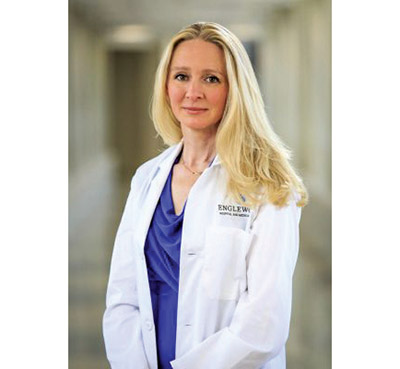
(Courtesy of Englewood Hospital and Medical Center) When Anna Serur, MD, was a little girl in her home country of Russia, she dreamed of becoming a doctor. “My mother says that from the time I was three, I always said I wanted to be a doctor…a surgeon. There was never anything else; not a ballerina, not an actress, always a surgeon,” she says.
“When my parents decided to move to the United States from Moscow, when I was 15 years old, I was glad. I wasn’t sure I would be able to get into medical school in Russia because I was Jewish. Here in the U.S. it wasn’t an issue.”
Dr. Serur received her medical degree from SUNY Downstate in Brooklyn, then completed a surgical residency at NewYork–Presbyterian Hospital and a fellowship in colorectal surgery at North Shore–LIJ Medical Center. She became director of colorectal surgery at Maimonides Medical Center in Brooklyn, where she was an attending surgeon for 10 years. Today, she is chief of colon and rectal surgery at Englewood Hospital and Medical Center. She specializes in minimally invasive and robotic colon and rectal surgery.
“At Englewood,” says Dr. Serur, “we can perform even the most complex surgeries, such as rectal cancer or ulcerative colitis surgery, using a minimally invasive approach: robotically or laparoscopically. We have excellent outcomes and very low complication rates.
“Minimally invasive surgery is easier on the patient because it causes fewer physiological changes and leads to an easier recovery. The surgery is performed using the same principles, regardless of how it’s done: robotically, laparoscopically, or open. With robotic surgery there is less blood loss, greater precision, and a quicker return to normal activities.”
Modern Colorectal Surgery
The techniques used to perform colon and rectal surgery have become more routine over the past 10 years. This is important because research has shown that the way the surgery is done, and who does it, strongly influences the outcome. “You want to go to a surgeon who does the surgery day in and day out. It’s extremely important. Particularly in rectal surgery, where the first treatment is critical,” adds Dr. Serur.
“Crohn’s disease and ulcerative colitis are common in Ashkenazi Jews. A person who has had ulcerative colitis for more than eight years—even if it is well controlled—is has a higher risk of colorectal cancer. It is important to find a physician with a lot of experience, someone with whom you are comfortable and can connect to. Our colon and rectal surgery team also performs surgery for diverticulitis, rectal prolapse, and chronic constipation not responsive to medical treatment.”
Don’t Ignore Symptoms
“We are seeing an increase in younger patients with colorectal cancer—sometimes patients 30 years old or younger,” says Dr. Serur, explaining that the national increase in obesity, changes in dietary habits, and increased sugar intake are likely having an impact.
“Do not ignore your symptoms,” she emphasizes. “If you start seeing blood in your stool or your bowel habits change, it doesn’t matter if you are 23 or 63, it should always be brought to the attention of a medical professional. Unfortunately,” she adds, “with colorectal cancers, it is often very late in the game when people are diagnosed. The current recommendation is age 50 for first colonoscopy, unless there is a personal or family history of ulcerative colitis, Crohn’s disease, or polyps. Then it should be earlier.”
A Team Approach
“Multidisciplinary care is so important in the treatment of cancer. At Englewood Hospital and Medical Center, we take a team approach,” explains Dr. Serur. “You get oncologists, surgeons, geneticists, a nutritionist, and other specialists. Good minds are put together, and a personalized pathway is developed for each patient. We really see each person as a person, not as a disease.”
Why colorectal surgery?
“I like treating cancer and being specialized. Of course, it’s very satisfying when a worried patient comes to me with a potentially life-threatening disease, and two weeks later all visible cancer is gone. It gives me a lot of satisfaction. For those with more advanced disease, I let them know that we are there for them, and that we will do everything in our power to make them well. I also treat a lot of benign conditions. When patients get better from something that was taking over their life, it’s a big blessing.”
How do you work with patients?
“Number one, I’m honest with them—I believe in sharing information with patients. I want to make sure that my patients understand that many cancers are potentially curable and that they understand the procedure they are about to undergo. I’m thorough in my explanation, and I try to bring it to their level of comprehension. Number two, I see the patient as my family member. It’s my mother, my grandmother, my sister. I treat them as I would want to be treated myself.”
What would your Jewish mother say about you?
“My mother? She thinks she did a good job raising me,” she says, smiling. “I tried to do and be the best that I can in my specialty.”










